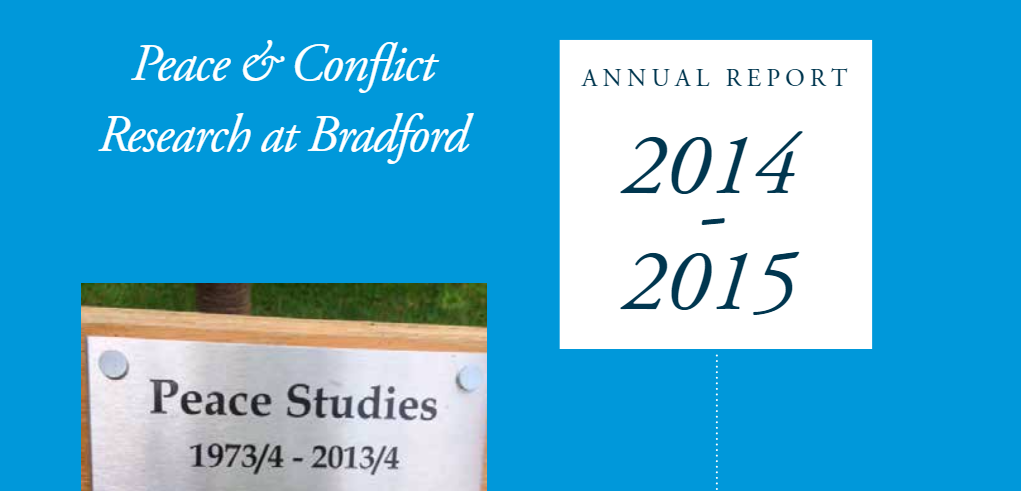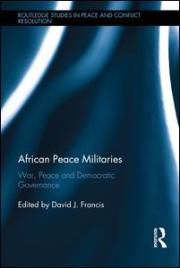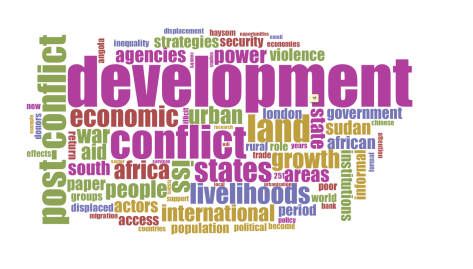Please note that the JEFCAS blog is not currently active, but will remain online as an archive.
JEFCAS is continuing its activities at the same time as reviewing its portfolio of work. Please follow the JEFCAS links for more details.







Please note that the JEFCAS blog is not currently active, but will remain online as an archive.
JEFCAS is continuing its activities at the same time as reviewing its portfolio of work. Please follow the JEFCAS links for more details.
Venue: Pemberton Room 2.11
Date: Wed 29th November 2017
Time: 4:00pm – 6:00pm
Speaker: Prof Nic Cheeseman, University of Birmingham

About Prof Nic Cheeseman: Nic Cheeseman is Professor of Democracy and International Development at the University of Birmingham. In addition to numerous book chapters, he is the author of Democracy in Africa: Successes, failures and the struggle for political reform (CUP, 2015) and over twenty journal articles including “Rethinking the ‘presidentialism debate’: Conceptualizing coalitional politics in cross-regional perspective” (Democratization, 2014), which won the inaugural GIGA prize for the best article published in Comparative Area Studies.
Professor Cheeseman is also the editor of the collections Our Turn to Eat: Politics in Kenya Since 1950 (2010), The Handbook of African Politics (2013), and African Politics: Major Works (2016), and two special issues of the Journal of Eastern African Studies on the Kenyan elections of 2007 and 2013. As well as being the former editor of the journal African Affairs, the #1 ranked journal in Area Studies, Professor Cheeseman is the founding editor of the Oxford Encyclopaedia of African Politics, the Oxford Dictionary of African Politics, and the co-editor of the Handbook of Kenyan Politics (forthcoming). These days, he spends much of his time writing about contemporary events in Africa in a bi-weekly column for Kenya’s Daily Nation newspaper. Professor Cheeseman also regularly provides analysis to the UK and US governments, and is an advisor to, and writer for, Kofi Annan’s African Progress Panel.
P.S: This is a rescheduled seminar from 25th October 2017
Venue: Pemberton Room 2.11
Date: Wed 22nd November 2017
Time: 4:00pm – 6:00pm
Speaker: Dr Giuditta Fontana, Leverhulme Fellow & Birmingham Fellow, University of Birmingham.

About Dr Giuditta Fontana: Dr Fontana is a Leverhulme Fellow and Birmingham Fellow. Her current project focuses on the interface between peace processes and reforms of cultural institutions (such as schools, the media and museums) in divided societies (such as Northern Ireland, Lebanon and the FYR of Macedonia).
Her research interests include post-conflict institution-building, power-sharing, education policy in divided societies, Mediterranean and Middle Eastern history and politics.
Giuditta is a United World College alumna and holds a BSc International Relations and History from the London School of Economics (2007) and an MA Mediterranean Studies from King’s College London (2008). Her PhD (awarded in October 2014 by King’s College London) focused on the political function of formal education in deeply divided societies and compared the experiences of Lebanon, Northern Ireland and the FYR of Macedonia.
Prior to her doctorate, Giuditta worked in a number of non-governmental and international organisations in Europe and the Middle East, including the European Commission and Minority Rights Group International.
Venue: Pemberton Room 2.11
Date: Wed 11th October 2017
Time: 4:00pm – 6:00pm
Speaker: Prof Bruce Baker, University of Coventry

About Prof Bruce Baker: Bruce Baker is Professor of African Security. His research and publications cover African policing (see http://www.africanpolicing.org) security and justice reform, local justice and governance. His last book, Security in Post-conflict Africa: The Role of Non-State Policing (CRC Press 2009) won the American Society of Criminology’s Prize for Best Book in Comparative and International Criminology 2010).
He has undertaken research and consultancies in Zimbabwe, Mozambique, South Africa, Rwanda, Uganda, The Gambia, Sierra Leone, Cape Verde, Seychelles, Liberia, South Sudan, Comoros, Madagascar, Ethiopia, Nigeria, Kenya and Afghanistan.
He is a Senior Security and Justice Advisor for the British government’s Civilian Stabilisation Group and is senior editor of the International Policing book series (CRC Press).

David J. Francis is the most recent Head of Department of Peace Studies and is currently Director of the John and Elnora Ferguson Centre for African Studies (JEFCAS), at the University of Bradford, UK. He is author/editor of eight books, including US Strategy in Africa (ed. Routledge, 2010).
This book provides a critical understanding of the emerging role of African militaries in peacetime democratic Africa.
This book departs from the dominant perspective which simply presents the military as an ‘enemy’ of democracy because of the history and legacy of unending military coup d’états and interventions in civilian politics. In the context of Africa, the military has been blamed or largely held responsible for instigating wars, armed conflicts, political violence, poverty and underdevelopment due to bad governance and mismanagement of the state. Drawing from diverse case studies across Africa, including Nigeria, Rwanda, Uganda, Ethiopia and Egypt, this volume presents the argument that though the military has played a negative, and sometimes, destructive role in undermining constitutional rule and the overthrow of democratic civilian governments, the same military, now operating in a changed global environment, is making effort to support the development of democracy and democratic consolidation as well as remain subjected to civilian democratic oversight and control. Notwithstanding, the real challenge for this emerging trend of African peace militaries is the extent to which they are able to fulfil, on a predictable and consistent basis, their constitutional mandate to defend the people against ‘elected autocrats’ in Africa who try to use the military to perpetuate themselves in power.
This work fills a critical gap in the literature and will be of much interest to students of African security and politics, peace and conflict studies, security studies and IR in general.
1. African Militaries in War, Peace and Support for Democratic Development, David J. Francis
2. The Military in Nigeria: War, peace and support for democratic governance, Oshita Oshita
3. The Rwanda Defence Force: from Genocide to Peace and Democratic Consolidation, Marco Jowell
4. Military in Uganda: war, peace and support for democratic consolidation, Eric Awich Ochen
5. Military Response to Boko Haram Insurgency in Nigeria: Implications for Peace, Security and Democracy in the Lake Chad Basin, Kenneth C. Omeje
6. African Solutions to Western Problems: Western-sponsored Training Programmes for African Militaries: impact on Peace and Democratic Consolidation, David Chuter
7. African Standby Force: Challenges and Opportunities for support of Democracy in Africa, Kasaija Phillip Apuuli
8. African Militaries, Security Sector Reform and Peace Dividends: a case study of Ethiopia’s post-1998 Defence Reform Experience and impact on Democratic Development, Ann Fitz-Gerald, Paula MacPhee & Ian Westerman
9. Egypt: the Military in War, Peace and Democratic Development, Joseph Lansana Kormoh

Post the Second World War, there has been an increase in intra-state conflict, civil wars and other forms of violence. They have become much more common than international war, affecting close to one quarter of all countries in the world by the mid-1990s. Over this period these forms of violence not only became more recurrent; they have also appeared to last longer (Fearon and Laitin, 2003). Violence is not a completely new phenomenon in the areas of development practice and theory. Rogers (1989) highlighted that there has been a perceived relationship between violence and development since the nineteenth century. The issue of violence in development discourse especially in analysis of the global south has however begun to gain more attention since the 1990s. For example, Africa and Latin America have largely been tagged as the most violent and notorious continents (UNCHS, 1996). The Department for International Development acknowledged violence as a pivotal developmental hindrance especially with regards to issues of poverty reduction (White, 1998; Short, 1999). For some scholars, the rationale behind war are such that are hinged on the opportunities and privileges afforded by chaotic situations to perpetrators of violence such as those tied to the opportunities they afford, as exemplified by the “Blood Diamond” loots of Sierra Leone and the profiteers from the DRC Congo war (Reno, 2000 and Mwanasali, 2001). Other scholars have approached the discourse from the perspective that argues that understanding the rationale behind violence cannot be understood exclusive of a proper understanding of economic development and vice versa (UNDP, 1994 and King and Murray, 2001). They situate their arguments within the context of the linkages of violence and development through “well-being”. This has given more drive to the proponents of the concept of human security[1].
In terms of conceptual clarifications, development has been conceptualised has a multidimensional phenomenon (Przeworski et al., 2000). Development is the process of improving the quality of all human lives and capabilities by raising people’s levels of living, self-esteem, and freedom. According to perhaps one of the most notable texts in development studies, “Development must be conceived as a multidimensional process that involves major changes in social structures, popular attitudes, and national institutions, as well as the acceleration of economic growth, the reduction of inequality, and the eradication of poverty , (Todaro and Smith, 2011). This therefore expounds the multiple angles associated with development, and possible links to development and the lack of it to violence. For example, poverty, a constituent dimension of development has been closely linked to Violence. A popular quote attributed to one of the famous novelist of African descent Buchi Emecheta expressed that “a hungry man is an angry one” and as such suggests a possible causative relationship between poverty and violence.
Similarly, the concept of Violence is multidimensional. Violence has been conceptualized in the contexts of Judicial, social and cultural, political and economic, that can stimulate the oppression of fellow human, as well as jettisons the opportunities of optimizing human realization and liberation. This is succinctly and aptly described as violence of the structures (Scheper-Hughes and Bourgois, 2004). The International community such as the OECD provided an alternative conceptualization for violence as the imposition and utilization of force and other means on fellow human for the sole objective of achieving a purpose (OECD, 2009).In the field of criminology Violence is perceived as individual or social actions that includes “destructive aggression and force use for the actualization of a pre-intended cause. Buvinic, Morrison and Shifter (1999) argued that this force use is not limited to just physical but can be psychological or any other form and the motive is to do harm. They concluded that the manifestations of violence therefore includes individual, domestic, organised and public. Violence therefore includes micro levels such as theft, homicide, domestic violence, kidnapping and macro levels such as genocide, war, ethnic clashes among others. Poveda, (2012) highlighted that these manifestations form some of the prevalent impediments to development and welfare of citizens in the developing world.
With violence now taking a major position in the economic development discourse, it therefore becomes necessary to briefly analyse the complex theoretical nexus of both multidimensional phenomena, as well as explain the growing interest in this relationship. Until recently, the traditional knowledge on Violence and Economic development was such that presented a positive relationship. (i.e has countries urbanised and industrialised, violence and crime rates increased). Similarly it was perceived that the nature of violence manifested adjusts with development (Rogers, 1989). This position has however been highly challenged in recent periods. A major basis for this criticism has been due to the fact that it was solely based on the nineteenth century experiences of Western Europe, which contemporary historical studies have faulted (McDonald, 1982). A second basis for this criticism has been based on the bourgeoning in conclusive findings from the developing world, which has proven the traditional generalisation flawed (Rogers, 1989 and Poveda, 2012). Although it however, remains necessary to state that quite a significant quantum of traditional knowledge on violence and economic development was ethnocentric, thereby leading to such generalisations, in consistency with the culture of poverty of Oscar Lewis and the Modernisation theory. Contemporary studies are similarly not immune against this line of thought. There is often tendencies to think of violence has a problem solely associated with the global south. However, empirics have shown that while the developed world tend to have more incidence of violence, compared to the developing world, the growth rate of violence in these developing countries is faster and often more violent that in the developed countries (Rogers, 1989; Zveki, 1990).
Therefore, prime of the rationales for the renewed interest in this violence-development nexus is the increasing urbanization rate which is perceived to be potent for violence due to its resultant inequality and urban poverty (Vanderschueren, 1996). Similarly important is the acknowledgement of the fact that large numbers of democratizing post-conflict states are still apt for violence (Berdal and Keen, 1997). Perhaps the most dominant and compelling factor, is that violence in more recent times is perceived as capable of jeopardizing the economic development opportunities of a country (Ayres, 1998). He linked this through the channels through which violence discourages investment Production and as such stunts economic growth. Craig and Mayo, (1998) linked this to its connections with empowerment and sustainable empowerment.
Similar to the multidimensionality of the concepts of Violence and development, so is the relationship that exists between both of them. A recent study by the OECD revealed that of the entire developing world, the “fragile states”[2] which are violence prone regions were the ones who lagged behind in achieving the millennium development goals (MDGs) (OECD, 2015). As at 2013 none of the fragile states had achieved any of the MDGS. The study however disclaimed that their might not yet any clear correlation between the MDG performance heterogeneity within these states. The Geneva declaration of 2010 stated that only a meagre 10 percent of the fragile states had the potentials of achieving the development goal reducing their poverty and hunger levels by half while slightly above 40 percent of the less fragile developing countries had achieved that objective as at 2010 (Geneva Declaration, 2010). In an earlier study by the World Bank, “The cost of Violence”, it was argued that while fragile states account for about a third of the developing world, after controlling for China, India and Russia, they however account for more than half of global poverty and two thirds of infant deaths (World Bank, 2009).
Indeed the consequences and cost of violence on development are often grave. While armed violence can be profitable to individual violence profiteers such as arms dealers its implication for the general public growth and development tends to devastating. For example it was estimated that annual armed violence cost ranges USD 60 to 250 billion (Collier et.al, 2008: P22). This over a 27 year period therefore sums up to a whopping USD 123 billion. They argued further that, if violence costs are inversely measured as “peace absence”, there can be possibilities of having a higher impact. Although, economic and development costs of armed violence is not equal and the same for all countries, they however concluded that it accounts for significant portions of national economies. The Global Peace Index in estimating the economic development cost of violence, examined the assets lost and investment forgone and concluded that less violence had the potential global economic gain of up to the tune of USD 4.8 trillion which connotes a global growth rate of about 9 percent (Global Peace Index 2010, p. 38). Brauer, and Dunne, (2010) estimated the 10 years post Guatemala war violence to USD 2.4 billion which accounts for about 7.3 percent of year 2005 GDP. This therefore suggests that violence has a way it uses up scarce resources that could have been used for developmental projects that would have improved the living standard and conditions of citizens.
On the other hand studies such as Stewart (2002) have argued that the root cause of violence particularly in developing countries is the very lack of development. In analysing this relationship, Stewart highlighted Four Hypothesis. Firstly Group inequality Motivation hypothesis: This analysed the relationship through the manifestations of under-development such as religious, ethnical class or geographical divides leading to violence, citing Bosnia’s class inequality violence. Secondly Private motivation and greed hypothesis: This derives from the profiteers of violence such as arms dealers or uneducated and unemployed youths who get recruited as soldiers or rebels in violent situations citing cases of Collier and Hoeffler (2000) analysis on Sudan and Sierra Leone. Thirdly is the Social-Contract Failure hypothesis: This derives from the analogy that with fiscal inadequacies and economic hardships, Social contract between the people and the government is broken and results in violence. Moyo (2008) cited the structural violence in Zimbabwe as a product of this. Lastly is the Green War Hypothesis: This derives from the environmental degradation as a form of poverty perspective. Stewart argued that in this case, the evidence is rather contradictory, claiming that both environmental poverty and resource wealth can be linked with violence, citing a case of Rwanda and Niger-Delta Nigeria.
In another article “Civil war is not a stupid thing” Cramer (2006) concluded that there are no clear pointers that violence necessarily impedes development. Luckahm (2017) succinctly put it that the development-violence nexus can either be synergetic or contradictory. He argued that development can either be as “Violence Prevention” or “Violence called”.
In conclusion, this essay has attempted to investigate the relationship between violence and development. The study presents conceptual clarifications for both phenomena and how the narrative on their relationship has evolved. While, the broader scope studies focused more on economic cost of violence that could have been otherwise used for developmental activities, the Case study focused more on developmental dimensions. It is however worthy to note that the underlying dimensions of interest of development for this study, is such as can be linked to socio-economic and for violence was armed violence. This is however by no means exhaustive of the possible manifestations of dimensions of both concepts as already expressed in the conceptual clarifications. Going by the arguments highlighted in the study, the relationship between economic development and violence can be said to be multifaceted, causative and complementary all at once, where the lack of development causes violence and the exhibition of violence causes development “deficit” through the cost of violence or development “surplus” through the framework of “violence called development”.
Footnotes
[1] A term used to try to re-conceptualise what human well-being means (traditionally measured using exclusively economic criteria) in order to take account of the impacts of violence.
[2] Canada’s Country Indicators for Foreign Policy project (CIFP) definition of fragile states extends beyond service entitlements to include those states that ‘lack the functional authority to provide basic security within their borders, the institutional capacity to provide basic social needs for their populations, and/or the political legitimacy to effectively represent their citizens at home or abroad’ (CIFP 2006).
Brauer, J. and Dunne, J.P.,( 2010). On the Cost of Violence and the Benefit of Peace. Peace Economics, Peace Science, and Public Policy, 16(2).
Buvinic, M., Morrison, A. and Shifter, M. (1999). “Violence in LatinAmerica and the Caribbean: A Framework for Action.” Technical Study, Inter-American Development Bank, Washington DC.
Centre for International Cooperation and Security (CICS) (2005) The Impact of Armed Violence on Poverty and Development. Bradford: University of Bradford.
CIFP (2006) ‘Fragile states: Monitoring and assessmnet; the way forward’. Carleton, Ottawa. CIFP
Collier, P. and Hoeffler, A., (2000). Greed and grievance in civil war, World Bank policy research working paper 2355. World Bank (http://www. worldbank. org/research/PDF).
Collier, P., Hoeffler, A. and Söderbom, M., (2008). Post-conflict risks. Journal of Peace Research, 45(4), pp.461-478.
Cramer, C. 2006 Civil War is Not a Stupid Thing. Accounting for Violence in Developing Countries (London: Hurst,) deconstructs established accounts of civil war.
Fearon, J. and Laitin, D., (2003). Ethnicity, insurgency, and civil war. American political science review, 97(01), pp.75-90.
Geneva Declaration, (2010). More violence, less development: Examining the relationship between armed violence and MDG achievement. Geneva Declaration on Armed Violence and Development, Geneva.
King, G. and Murray, C., (2001). Rethinking human security. Political science quarterly, 116(4), pp.585-610.
Luckham, R., (2017). Whose violence, whose security? Can violence reduction and security work for poor, excluded and vulnerable people?. Peacebuilding, pp.1-19.
Moyo, O., (2008). Surviving structural violence in Zimbabwe: The case study of a family coping with Violence. Bulletin de l’APAD, pp.27-28.
Mwanasali, M., (2000). The view from below. Berdal & Malone (Eds.), pp.137-153.
Organisation for Economic Co-operation and Development (OECD), (2009). “Conflict and Fragility Armed Violence Reduction: Enabling Development.” www.oecd.org
OECD (2015), States of Fragility 2015: Meeting Post-2015 Ambitions, OECD Publishing, Paris.
Poveda, A., (2012). Empirical research on the relationship between violence and social development in Colombia. Ensayos Revista de Economia, 31(2), pp.37-56.
Przeworski, A., (2000). Democracy and development: Political institutions and well-being in the world, 1950-1990 3(1). Cambridge University Press.
Reno, W. (2000). “Shadow States and the Political Economy of Civil Wars.” (Ch.3 of Berdal and Malone 2000)
Rogers, J. (1989) Theories of crime and development: an historical perspective. Journal of Development Studies 25, pp.314-28.
Scheper-Hughes, N. and Bourgois, P. eds.,(2004). Violence in war and peace (pp. 1-31). Oxford: Blackwell.
Short, C. (1999). Security sector reform and the elimination of poverty. A speech held at the Centre for Defence Studies, King’s College London. March.
Stewart, F. (2002). Root causes of violent conflict in developing countries. British Medical Journal, 324(7333), p.342-345
Stewart, F. (ed.) (2008) Horizontal Inequalities and Conflict: Understanding Group Violence in Multiethnic Societies. Basingstoke: Palgrave Macmillan.
Todaro, M. P. and Smith, S. C. (2012). Economic Development. (11th edition), Boston: Addison-Wesley.
White, H., (1998). British aid and the White Paper on International Development: dressing a wolf in sheep’s clothing in the emperor’s new clothes?. Journal of International Development, 10(2), pp.151-166.
World Bank (2009) The Costs of Violence. Washington D.C.: World Bank.
Authors
Laniran Temitope Joseph
Ph.D. Candidate Economics and Development Studies, University of Bradford
Research Associate John and Elnora Ferguson Centre for African Studies, Bradford, and Centre for Petroleum, Energy Economics and Law, Ibadan
and
Umar Baba Aliyu
Department of Peace Studies, University of Bradford
Disclaimer: The views and opinions expressed in this article are those of the authors and do not necessarily reflect the official stance or position of any of the above named institutions.
The Third Annual Peace Studies & International Development Conference for Africanist Doctoral Students and Early Post-Doctoral Career Scholars and Practitioners hosted by JEFCAS took place at the Bright Building University of Bradford on 11th May 2017.
The Theme for the conference was Resources, Conflict and Development in Africa.
The Conference provided a platform where Africanist researchers from various continents of the globe including Africa, Asia and Europe could exchange ideas and engage in critical intellectual debates across the spectrum of the conference theme.
Professor David Francis, Director of JEFCAS gave a thought provoking speech that provided an appropriate atmosphere for further intellectual discussions by the various panellists and presenters. The conference was closed with a well-articulated presentation by Professor Kenneth Omeje, Senior Research Fellow at JEFCAS that provided a well-rounded summation of the issues discussed at the Conference.
Below is the link to the programme as well as some of the captured moments at the conference:
jefcas.files.wordpress.com/…/jefcas-conference-programme.pdf
The annual Peace Studies & International Development conference for Africanist doctoral students and early post-doctoral career scholars and practitioners is scheduled to take place on the 11th May 2017 at the University of Bradford in United Kingdom.
The conference theme is: Resources, Conflict and Development in Africa.
Conference cluster themes include:
1) Natural Resources and Conflict
2) Transition from Resource Conflict to Peace and Peacebuilding
3) Natural Resources, Demographic Change and Development
4) Conflict, Security, Peace and Development Nexus
5) Regional Integration, Security and Development
6) Africa and the Rest of the World
https://www.eventbrite.co.uk/e/resources-conflict-and-development-in-africa-tickets-33989318968
Venue: Pemberton Room 2.11
Date: Wed 3rd May 2017
Time: 16:00 – 18:00
Speaker: Professor Peter Woodward (University of Reading)

About Prof Peter Woodward:
Professor Peter Woodward worked for the VSO in Kosti, Sudan from 1966-67 and then became a Lecturer in Political Science at the University of Khartoum until 1971 when he joined the Department of Politics at the University of Reading. He was also a Visiting Lecturer at the University of Natal, Durban in 1991 and 1993, and at the American University in Cairo in 1999.
Professor Woodward is regularly consulted on African affairs by various branches of government in several countries including the FCO; DFID; the US House of Representatives sub-committee on Africa; and US State Department. He also contributes to various media outlets, most regularly to the BBC World Service. He acted as Rapporteur for Sudan peace talks at the Carter Center in 1993, Chaired jointly by President Jimmy Carter and Archbishop Desmond Tutu; and Chaired constitutional talks on Sudan for the International Dialogues Foundation, Durham, 1999.
The annual Peace Studies & International Development conference for Africanist doctoral students and early post-doctoral career scholars and practitioners is scheduled to take place on the 11th May 2017 at the University of Bradford in United Kingdom.
The conference theme is: Resources, Conflict and Development in Africa.
Conference cluster themes include:
1) Natural Resources and Conflict
2) Transition from Resource Conflict to Peace and Peacebuilding
3) Natural Resources, Demographic Change and Development
4) Conflict, Security, Peace and Development Nexus
5) Regional Integration, Security and Development
6) Africa and the Rest of the World
To attend please register at : https://www.eventbrite.co.uk/e/resources-conflict-and-development-in-africa-tickets-33989318968